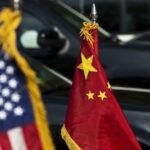China has taken a firm stance against threats of a 100% tariff from the United States, signaling its unwillingness to relent under pressure. In a statement released by the Commerce Ministry, China urged the U.S. to settle trade differences through negotiations rather than resorting to threats, emphasizing, “We do not want a tariff war but we are not afraid of one.”
This declaration came two days following President Donald Trump’s announcement of plans to increase tariffs on imports from China by November 1, a move prompted by new Chinese restrictions on the export of rare earths—a critical resource used extensively in consumer electronics and military applications.
The escalating tensions between the two economic powerhouses pose a significant risk to a potential meeting between Trump and Chinese leader Xi Jinping, threatening to derail a temporary truce in their ongoing trade conflict. Earlier in the year, tariffs from both nations had briefly surged past the 100% mark.
Despite Trump’s aggressive tariff strategy aimed at securing concessions, China has remained resolute. The country’s Commerce Ministry criticized the frequent use of tariff threats, arguing that such actions do not foster a cooperative relationship. The government underscored the importance of dialogue to address mutual concerns. “If the U.S. side obstinately insists on its practice, China will be sure to resolutely take corresponding measures to safeguard its legitimate rights and interests,” the statement cautioned.
Both nations have accused each other of undermining the truce by imposing new trade restrictions. Trump characterized China as “becoming very hostile,” claiming its actions in restricting access to rare earth metals are holding the world captive. In response, China has implemented new regulations that require foreign companies to obtain special approval to export items containing even minimal amounts of rare earth elements sourced from the country.
China controls approximately 70% of global rare earths mining and wields dominance over about 90% of their processing. The access to these essential minerals remains a pivotal issue in ongoing trade discussions between Washington and Beijing. In light of this, the Chinese government confirmed that export licenses would be issued for legitimate civilian uses, underscoring the minerals’ military significance as well.
The escalating trade rift is marked by reciprocal actions; notable recently is the U.S. expanding the number of Chinese companies subjected to export controls. Additionally, the U.S. is advancing new port fees on Chinese shipping vessels, set to take effect imminently. In retaliation, China announced the imposition of similar port fees on American ships, indicating the potential for further escalation.
As the situation evolves, both sides remain entrenched in their positions, suggesting that the path to resolution may be fraught with challenges.







